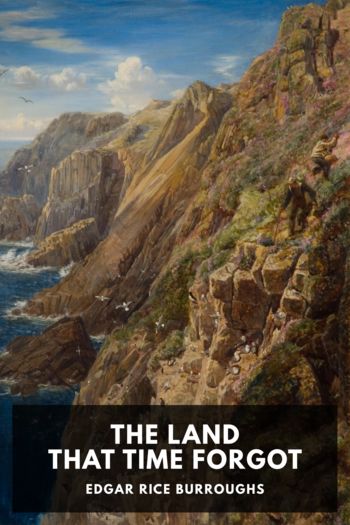The Land That Time Forgot, Edgar Rice Burroughs [books suggested by bill gates TXT] 📗

- Author: Edgar Rice Burroughs
Book online «The Land That Time Forgot, Edgar Rice Burroughs [books suggested by bill gates TXT] 📗». Author Edgar Rice Burroughs
I could have knelt and kissed her hand in reverence and gratitude; nor am I ashamed to say that that is precisely what I did after I had been freed from my bonds and heard the story of her trials. Brave little Ajor! Wonder-girl out of the dim, unthinkable past! Never before had she been kissed; but she seemed to sense something of the meaning of the new caress, for she leaned forward in the dark and pressed her own lips to my forehead. A sudden urge surged through me to seize her and strain her to my bosom and cover her hot young lips with the kisses of a real love, but I did not do so, for I knew that I did not love her; and to have kissed her thus, with passion, would have been to inflict a great wrong upon her who had offered her life for mine.
No, Ajor should be as safe with me as with her own mother, if she had one, which I was inclined to doubt, even though she told me that she had once been a babe and hidden by her mother. I had come to doubt if there was such a thing as a mother in Caspak, a mother such as we know. From the Bo-lu to the Kro-lu there is no word which corresponds with our word mother. They speak of ata and cor sva jo, meaning “reproduction” and “from the beginning,” and point toward the south; but no one has a mother.
After considerable difficulty we gained what we thought was our cave, only to find that it was not, and then we realized that we were lost in the labyrinthine mazes of the great cavern. We retraced our steps and sought the point from which we had started, but only succeeded in losing ourselves the more. Ajor was aghast—not so much from fear of our predicament; but that she should have failed in the functioning of that wonderful sense she possessed in common with most other creatures Caspakian, which makes it possible for them to move unerringly from place to place without compass or guide.
Hand in hand we crept along, searching for an opening into the outer world, yet realizing that at each step we might be burrowing more deeply into the heart of the great cliff, or circling futilely in the vague wandering that could end only in death. And the darkness! It was almost palpable, and utterly depressing. I had matches, and in some of the more difficult places I struck one; but we couldn’t afford to waste them, and so we groped our way slowly along, doing the best we could to keep to one general direction in the hope that it would eventually lead us to an opening into the outer world. When I struck matches, I noticed that the walls bore no paintings; nor was there other sign that man had penetrated this far within the cliff, nor any spoor of animals of other kinds.
It would be difficult to guess at the time we spent wandering through those black corridors, climbing steep ascents, feeling our way along the edges of bottomless pits, never knowing at what moment we might be plunged into some abyss and always haunted by the ever-present terror of death by starvation and thirst. As difficult as it was, I still realized that it might have been infinitely worse had I had another companion than Ajor—courageous, uncomplaining, loyal little Ajor! She was tired and hungry and thirsty, and she must have been discouraged; but she never faltered in her cheerfulness. I asked her if she was afraid, and she replied that here the Wieroo could not get her, and that if she died of hunger, she would at least die with me and she was quite content that such should be her end. At the time I attributed her attitude to something akin to a doglike devotion to a new master who had been kind to her. I can take oath to the fact that I did not think it was anything more.
Whether we had been imprisoned in the cliff for a day or a week I could not say; nor even now do I know. We became very tired and hungry; the hours dragged; we slept at least twice, and then we rose and stumbled on, always weaker and weaker. There were ages during which the trend of the corridors was always upward. It was heartbreaking work for people in the state of exhaustion in which we then were, but we clung tenaciously to it. We stumbled and fell; we sank through pure physical inability to retain our feet; but always we managed to rise at last and go on. At first, wherever it had been possible, we had walked hand in hand lest we become separated, and later, when I saw that Ajor was weakening rapidly, we went side by side, I supporting her with an arm about her waist.





Comments (0)